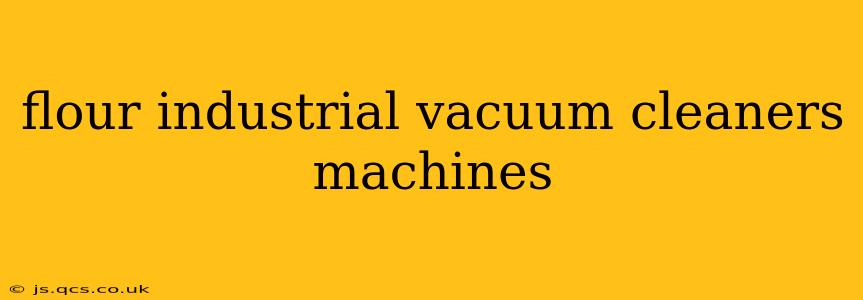Flour dust presents significant challenges for industrial facilities. Not only is it messy, but it also poses a serious fire and explosion hazard. Therefore, choosing the right industrial vacuum cleaner is crucial for maintaining a safe and productive work environment. This guide explores the key features and considerations when selecting flour industrial vacuum cleaners.
What are the Different Types of Flour Industrial Vacuum Cleaners?
Industrial vacuum cleaners for flour handling vary significantly in their design and capabilities. The most common types include:
-
High-efficiency particulate air (HEPA) vacuums: These are essential for capturing fine flour particles, preventing them from becoming airborne and minimizing the risk of explosions. HEPA filters are rated to capture at least 99.97% of particles 0.3 microns in size.
-
Explosion-proof vacuums: Designed to operate safely in potentially explosive atmospheres, these vacuums incorporate features like flame-proof motors and conductive hoses to prevent static electricity buildup. They're crucial in environments with high concentrations of combustible flour dust.
-
Central vacuum systems: These systems consist of a central vacuum unit and a network of piping that connects to various cleaning points throughout the facility. Central vacuum systems are highly effective for large-scale flour cleanup operations, offering efficient dust collection and disposal.
-
Wet/dry vacuums: While not exclusively designed for flour, robust wet/dry vacuums with HEPA filtration can handle spills and cleanup effectively. However, ensure the vacuum is rated for combustible dust and has appropriate safety features.
What are the Key Features to Consider When Choosing a Flour Industrial Vacuum Cleaner?
Several critical features distinguish effective flour industrial vacuum cleaners:
-
Filtration System: HEPA filtration is a must. Look for vacuums with multiple filter stages for optimal dust capture. Regular filter replacement is critical.
-
Motor Power and Suction: Sufficient power is crucial for effectively removing flour dust from various surfaces and crevices. Consider the size of your facility and the volume of flour dust generated.
-
Construction Materials: The vacuum's construction should be durable and resistant to flour dust accumulation. Stainless steel or other easily cleaned materials are ideal.
-
Safety Features: Explosion-proof certification is paramount in areas where flour dust poses an explosion risk. Look for features like grounding wires and static-dissipative hoses.
-
Ease of Maintenance and Cleaning: Regular maintenance is essential to ensure optimal performance and safety. Choose a vacuum with easily accessible components for simple cleaning and filter replacement.
How Often Should I Replace the Filters in My Flour Industrial Vacuum Cleaner?
Filter replacement frequency depends on usage intensity and the type of filter. Consult your vacuum cleaner's manual for specific recommendations, but generally, expect to replace HEPA filters more frequently than other filter types due to their higher efficiency in capturing fine particles. Regular inspections are crucial; if you notice a significant reduction in suction, it's time for a filter change.
What Safety Precautions Should I Take When Using a Flour Industrial Vacuum Cleaner?
Always follow the manufacturer's instructions carefully. Key safety precautions include:
-
Proper grounding: Ensure the vacuum is properly grounded to prevent static electricity buildup.
-
Regular maintenance: Regularly inspect and clean the vacuum to maintain its effectiveness and prevent hazards.
-
Appropriate personal protective equipment (PPE): Wear appropriate PPE, including dust masks, safety glasses, and gloves, during operation.
-
Ventilation: Ensure adequate ventilation in the work area to minimize dust concentration.
-
Training: Proper training for all operators is crucial to ensure safe and effective use of the equipment.
What is the Cost of a Flour Industrial Vacuum Cleaner?
The cost of an industrial vacuum cleaner for flour varies widely, depending on its features, size, and capabilities. Explosion-proof models and central vacuum systems tend to be significantly more expensive than standard HEPA vacuums. It's crucial to balance cost with the need for safety and effectiveness. Investing in a high-quality vacuum is a cost-effective way to prevent costly accidents and downtime.
By carefully considering these factors, you can select the appropriate flour industrial vacuum cleaner to maintain a clean, safe, and productive workplace. Remember, safety should always be the top priority when handling combustible dust like flour.
